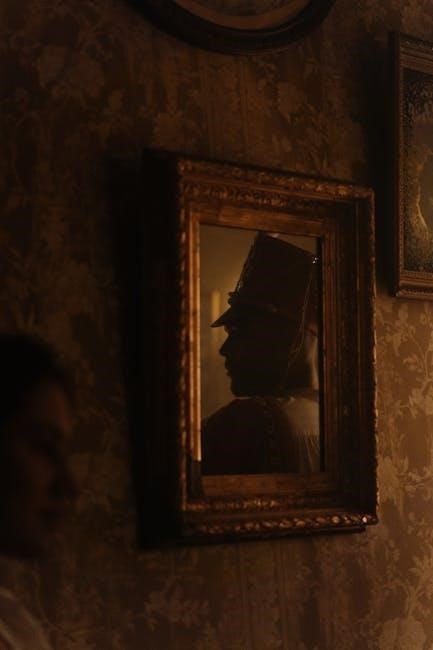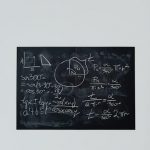
Virginia Woolf’s The Legacy explores themes of ego, jealousy, and identity through Gilbert Clandon’s journey, revealing a profound psychological depth and historical context in 1944.
Background of the Document
The Legacy, a short story by Virginia Woolf, was written in 1944, marking one of her later works before her death in 1941. The document, widely available as a PDF, explores themes of identity, ego, and societal roles, reflecting Woolf’s deep psychological insights. Originally published posthumously, it gained attention for its nuanced portrayal of human relationships and internal conflicts. The story is part of Woolf’s broader literary legacy, which often examined gender dynamics and personal independence. Its digital format has made it accessible globally, contributing to its enduring popularity. The PDF version preserves the original narrative structure, offering readers a window into Woolf’s unique writing style and philosophical musings. This document remains a significant piece in understanding Woolf’s exploration of human complexity and societal expectations during the early 20th century.

Publication Details and Historical Context
The Legacy, written by Virginia Woolf in 1944, was published posthumously, offering a unique glimpse into her later literary style. The story was composed during a tumultuous period in history, reflecting the societal shifts and personal introspections of the early 20th century. Its release coincided with a growing interest in Woolf’s work, solidifying her reputation as a pioneering modernist writer. The document, now widely available as a PDF, has been translated into multiple languages, broadening its reach. Historically, it captures the essence of Woolf’s exploration of human relationships and psychological depth, set against the backdrop of wartime England. The PDF format has made the text accessible to a global audience, ensuring its relevance in contemporary literary discussions. This work remains a testament to Woolf’s enduring influence on 20th-century literature.
Plot Summary of “The Legacy”
Gilbert Clandon uncovers his late wife Angela’s hidden life through her diaries, revealing a complex exploration of love, loss, and self-discovery in 1940s England profoundly;
Overview of the Storyline
The story revolves around Gilbert Clandon, a widower and politician, who uncovers the hidden life of his deceased wife, Angela, through her diaries. After her accidental death, Gilbert is perplexed by her final actions, leading him to read her private writings. The diaries reveal Angela’s inner world, her feelings of suffocation in their marriage, and her secret love for a radical working man. This discovery forces Gilbert to confront his own ego, jealousy, and the societal expectations that shaped their relationship. The narrative explores themes of identity, independence, and gender roles, offering a profound reflection on marriage, love, and self-discovery. Woolf’s masterful storytelling weaves together psychological depth and social commentary, creating a compelling exploration of human complexity.
Narrative Structure and Perspective
The story is told entirely from Gilbert Clandon’s perspective, offering a deeply personal and introspective narrative. Woolf’s use of a single viewpoint creates a tight psychological focus, allowing readers to experience Gilbert’s emotional journey firsthand. The narrative unfolds through Gilbert’s reflections on his wife Angela’s death and his subsequent discovery of her diaries. This structure enables a gradual revelation of Angela’s hidden life, contrasting sharply with Gilbert’s perceptions of their marriage. The diaries serve as a counterpoint to Gilbert’s narrative, exposing his blind spots and challenging his self-image. Woolf’s mastery of perspective highlights the subjective nature of truth, as Gilbert’s understanding of Angela evolves from idealization to a more nuanced reality. The interplay between Gilbert’s voice and Angela’s diaries creates a rich, layered narrative that explores themes of identity and perception. This structure underscores Woolf’s innovative storytelling and her ability to weave psychological complexity into the text.
Main Characters in “The Legacy”
Gilbert Clandon, a politician, and his deceased wife Angela are central figures, with her diaries revealing hidden aspects of their relationship and her inner life dynamics.
Gilbert Clandon: The Protagonist
Gilbert Clandon is the central character and narrator of The Legacy, a successful yet introspective politician grappling with the sudden death of his wife, Angela. His narrative voice dominates the story, offering a deeply personal and often biased perspective on their marriage and her final days. Gilbert’s character is marked by a mix of emotional detachment and underlying vulnerability, as he struggles to understand Angela’s actions and emotions, particularly her unexpected death. Through his eyes, the reader witnesses his gradual realization of the complexities in their relationship, revealing themes of ego, jealousy, and identity. Gilbert’s journey is one of self-discovery, as he confronts the truths hidden in Angela’s diaries, forcing him to reevaluate his own role in their marriage and the societal expectations that shaped their lives.
Angela Clandon: The Deceased Wife
Angela Clandon, Gilbert’s deceased wife, is a pivotal figure in The Legacy, whose life and emotions are revealed posthumously through her diaries. Her death leaves Gilbert perplexed, as he uncovers her inner world, which was largely hidden during their marriage. Angela’s character is defined by her quiet strength and introspection, contrasting with Gilbert’s outward confidence and political ambition. Through her diaries, Angela’s voice emerges, expressing her feelings of isolation and unfulfilled desires, including her deep connection with a radical working-class man. This revelation challenges Gilbert’s perception of their marriage and forces him to confront the emotional distance between them. Angela’s legacy, as portrayed in the story, is one of suppressed identity and longing, highlighting the societal constraints placed on women during her time. Her character serves as a counterpoint to Gilbert’s narrative, offering a deeper exploration of their relationship and the themes of identity and equality.
Minor Characters and Their Roles
In The Legacy, minor characters play a subtle yet significant role in shaping the narrative and themes. Angela’s radical working-class lover, though unnamed, is a pivotal figure whose presence in her diaries challenges Gilbert’s understanding of their marriage. His political associates and colleagues are mentioned briefly, highlighting Gilbert’s public persona and contrasting with his private struggles. These characters serve to underscore the societal norms and expectations of the time, particularly regarding gender roles and class divisions. While they are not fully developed, their presence adds depth to the story, emphasizing the emotional and ideological conflicts central to the plot. Their roles, though limited, contribute to the exploration of identity, equality, and the complexities of human relationships in Woolf’s narrative.
Themes Explored in “The Legacy”
Ego, jealousy, identity, and gender roles are central, with a focus on independence, equality, and the transformative power of awareness and change in human relationships.

Ego and Jealousy in Relationships
In The Legacy, Virginia Woolf delves into the destructive forces of ego and jealousy within relationships, particularly through Gilbert Clandon’s perspective. Gilbert, a politician, struggles with his wife Angela’s independence and her emotional detachment, which he interprets as a personal failure. His ego is wounded by her lack of admiration for his political career, while her diary revelations after her death expose his jealousy. The story highlights how Gilbert’s inability to understand Angela’s inner world creates a chasm in their relationship. Woolf portrays ego as a barrier to genuine connection, while jealousy emerges as a corrosive emotion that distorts perceptions. Through this lens, the narrative critiques societal expectations of marriage and the limitations imposed by rigid gender roles. The interplay of these themes underscores the psychological complexity of the characters and the tragic consequences of unresolved conflicts.
Identity and Independence

In The Legacy, Virginia Woolf explores the theme of identity and independence through Angela Clandon’s character. Angela’s diaries reveal her deep desire for self-discovery and autonomy, which contrasts sharply with her role as a politician’s wife. Her independence is stifled by societal expectations and Gilbert’s traditional views, leading to a sense of suffocation. Woolf portrays Angela’s struggle to assert her individuality in a patriarchal world, where women’s identities are often defined by their relationships with men. The story highlights the tension between personal aspirations and societal constraints, particularly for women. Angela’s ultimate act of suicide symbolizes the tragic consequences of suppressed identity and the inability to reconcile her inner self with the world around her. This theme resonates deeply, offering a poignant critique of the limitations placed on women’s lives during that era.
Gender Roles and Equality
In The Legacy, Virginia Woolf critiques the rigid gender roles of her time, particularly through the contrasting lives of Gilbert and Angela Clandon. Gilbert, a politician, embodies traditional masculinity, prioritizing career and societal expectations over personal relationships. In contrast, Angela’s diaries expose her stifled desires and the limitations imposed on women by patriarchal norms. Woolf highlights the inequality in their marriage, where Angela’s identity is overshadowed by Gilbert’s public persona. The story underscores the societal constraints that forced women into submissive roles, denying them autonomy and equality. Angela’s tragic fate serves as a powerful commentary on the suffocating gender roles of the era, emphasizing the need for change and challenging readers to reflect on the broader implications of such inequality. Woolf’s portrayal remains a poignant critique of gender disparities, resonating with contemporary discussions on equality and justice.
Awareness and Change
The Legacy by Virginia Woolf delves into the transformative power of awareness and the potential for personal and societal change. Gilbert Clandon’s journey through his wife Angela’s diaries forces him to confront his own ego and the limitations of his perspective. This newfound awareness reveals the emotional distance in their relationship and the societal constraints that shaped their lives; Woolf explores how self-reflection can lead to understanding and growth, even in the face of tragedy. The story suggests that change begins with acknowledging the past and its impact on the present. Through Gilbert’s evolving mindset, Woolf advocates for a shift in societal norms, particularly in how men and women perceive and interact with one another. The narrative ultimately calls for a reevaluation of relationships and the pursuit of equality, emphasizing the importance of awareness as a catalyst for change. This theme remains central to the story’s enduring relevance.

Symbolism in “The Legacy”
The diaries in The Legacy symbolize hidden truths and unspoken emotions, while the contrast between Gilbert’s political life and Angela’s personal struggles reflects deeper societal and psychological tensions.
The Significance of the Diaries
The diaries in The Legacy serve as a pivotal narrative device, uncovering Angela’s inner world and contrasting sharply with Gilbert’s perceptions of their marriage. Through these intimate writings, Woolf reveals Angela’s suppressed emotions, desires, and struggles, offering a counterpoint to Gilbert’s self-centered worldview. The diaries symbolize the hidden truths of their relationship, exposing the emotional distance and misunderstandings that defined it. They also represent Angela’s quest for identity and independence, challenging Gilbert’s patriarchal assumptions. By delving into the diaries, Gilbert—and the reader—gains insight into the complexities of their bond and the societal constraints that shaped their lives. The diaries thus become a metaphor for the unspoken realities in relationships and the enduring power of self-expression.
Political and Social Undertones
The Legacy by Virginia Woolf is deeply infused with political and social undertones, reflecting the tensions of its historical context. Gilbert Clandon, a right-wing politician, embodies conservative values, while Angela’s connection to a radical working man symbolizes a clash between tradition and progress. The story critiques societal norms, particularly gender roles, as Angela’s diaries reveal her suffocation under patriarchal expectations. Woolf explores the duality of public and private lives, highlighting how political ideologies shape personal relationships. The narrative also touches on class divisions, as Angela’s admiration for the working man challenges Gilbert’s elitist worldview. Through these elements, Woolf underscores the need for societal change and individual awareness, making The Legacy a profound commentary on the interplay between politics, gender, and identity in the early 20th century.

Reception and Impact of “The Legacy”
The Legacy gained significant attention for its exploration of ego, jealousy, and identity, resonating with readers upon its 1944 release and remaining a popular, translated work worldwide.
Initial Reception and Reviews

Upon its release in 1944, The Legacy received mixed reviews, with critics praising its psychological depth while others found its narrative complexity challenging. The story’s exploration of ego, jealousy, and identity resonated deeply, particularly through the contrasting perspectives of Gilbert and Angela. Many reviewers highlighted Woolf’s ability to weave intricate emotional landscapes, though some deemed the tale emotionally demanding due to its dark undertones. The revelation of Angela’s secret life and Gilbert’s subsequent self-reflection were seen as bold narrative choices. The story’s themes of gender roles and political undertones also sparked discussion, with some critics applauding its progressive commentary. Overall, The Legacy was celebrated for its nuanced portrayal of human complexity, solidifying Woolf’s reputation as a master of introspective storytelling.
Modern Relevance and Interpretations
Today, The Legacy remains a poignant exploration of human relationships, identity, and societal expectations. Modern readers and scholars continue to appreciate its timeless themes, particularly the interplay of ego, jealousy, and independence. The story’s focus on gender roles and equality resonates strongly in contemporary discussions about feminism and power dynamics. Gilbert’s journey of self-discovery and the revelation of Angela’s hidden life offer a nuanced commentary on marriage, love, and individuality. The political undertones, particularly the contrast between Gilbert’s conservative views and Angela’s radical connections, add depth to its modern interpretation. Woolf’s ability to capture the complexity of human emotions ensures that The Legacy remains a vital work in literary studies, offering fresh insights into universal struggles and aspirations.

Adaptations and Related Works
The Legacy has inspired various interpretations, though no major film or stage adaptations exist. Its themes are often referenced in modern literature and scholarly discussions.

Film and Stage Adaptations
Despite its profound themes and intricate narrative, The Legacy has not been adapted into any major films or stage productions. The story’s introspective nature, focusing on Gilbert’s internal struggles and the posthumous revelations through Angela’s diaries, presents challenges for visual or theatrical interpretations. Its psychological depth and subtle emotional layers may require a nuanced approach that has yet to be fully realized in adaptations. However, the story’s exploration of identity, jealousy, and societal roles continues to inspire literary discussions and academic analyses. While no direct adaptations exist, its influence can be seen in works that explore similar themes of marital dynamics and self-discovery. The lack of adaptations underscores the story’s reliance on Woolf’s unique prose and the intimate, personal journey of its characters.
References in Other Literary Works
Virginia Woolf’s The Legacy has left a subtle yet profound impact on literary works that explore themes of identity, marital dynamics, and societal roles. While not directly referenced, its influence can be seen in contemporary novels that delve into psychological complexity and introspection. Authors inspired by Woolf’s unique prose often incorporate similar explorations of ego, jealousy, and independence in their characters. The story’s focus on diary entries as a narrative device has also been echoed in works that use personal documents to uncover hidden truths. Though specific references are rare, The Legacy remains a cornerstone of literary analysis, particularly in feminist and modernist studies. Its themes continue to resonate in literature that examines the intricacies of human relationships and societal expectations.
Virginia Woolf’s The Legacy remains a poignant exploration of human psychology, relationships, and societal norms. Through Gilbert Clandon’s journey, Woolf masterfully examines themes of ego, jealousy, and identity, offering a profound commentary on marital dynamics and gender roles. The story’s narrative structure, particularly the use of diaries, provides a unique lens into the inner lives of its characters. Published in 1944, The Legacy continues to resonate with modern readers, its themes of independence and equality remaining relevant today. Woolf’s prose, as always, is both lyrical and incisive, leaving a lasting impact on literary discourse. The story’s influence is evident in its adaptations and references in other works, cementing its place as a significant contribution to 20th-century literature.





